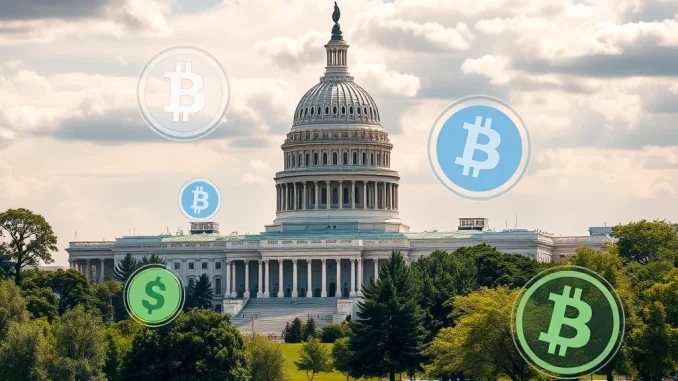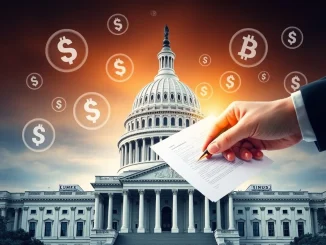
The political arena in Washington is heating up, and this time, the spotlight is firmly on digital assets. Specifically, a crucial stablecoin bill is facing a tense standoff in the U.S. Senate, highlighting the ongoing challenges of crafting effective crypto legislation.
Senate Republicans Championing the Stablecoin Bill
Leading the charge is Senate Majority Leader John Thune, who is actively pushing for the advancement of the Guiding and Establishing National Innovation for U.S. Stablecoins, or GENIUS Act. This move marks Senator Thune’s first significant legislative effort directly addressing the crypto space. The proposed legislation aims to establish a clear regulatory framework specifically for entities issuing stablecoins in the United States.
Initially, the GENIUS Act demonstrated promising bipartisan support, successfully clearing the Senate Banking Committee with a strong 18-6 vote. This initial consensus suggested a smoother path forward for creating much-needed stablecoin regulation.
Why the Sudden Halt? Democrat Concerns Emerge
Despite the early bipartisan backing, the path for the stablecoin bill has become complicated. Democrats, who previously supported the bill’s progression, are now reportedly hesitant to move forward with further debate. The resistance stems from concerns related to former President Trump’s business interests within the crypto sector. This political dynamic has introduced uncertainty into the legislative process.
What’s Next for the GENIUS Act? A Crucial Vote Looms
The immediate future of the bill hinges on a critical procedural step: a cloture vote. Scheduled for 1:45 p.m., this vote is essential to limit debate and allow the bill to proceed. However, passing cloture in the Senate requires a significant hurdle – 60 votes. This means the bill needs substantial support, including votes from both parties, to overcome the current stall.
Senator Thune emphasizes the potential benefits of the GENIUS Act, arguing that the legislation would:
- Provide regulatory clarity for innovators in the digital asset space.
- Establish robust anti-money laundering (AML) safeguards.
- Offer essential protections for consumers utilizing US stablecoins.
These points, as reported by CoinDesk, underscore the potential positive impacts of comprehensive stablecoin regulation, aiming to foster responsible growth while mitigating risks.
The Path Forward for US Stablecoins and Crypto Legislation
The current situation in the Senate highlights the complex intersection of technology, finance, and politics. While Senate Republicans are keen to advance the GENIUS Act to bring regulatory certainty to US stablecoins, the political considerations surrounding the upcoming election and specific business interests are creating obstacles. The outcome of the cloture vote will be a significant indicator of whether this key piece of crypto legislation can overcome partisan divides and move closer to becoming law.
Navigating the legislative landscape remains a critical challenge for the crypto industry. The push for clear stablecoin regulation continues, but its success depends heavily on political will and the ability of lawmakers to find common ground amidst differing priorities and concerns.



